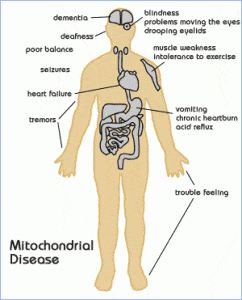
Mitochondria are one of the most important parts of any living cell. It is the tiny structure that acts as a powerhouse for any animal or human cell. If therefore there is mitochondrial failure it may impair the functioning of many organs and organ systems of the body.
Although mitochondrial disorders are very rare, there are hundreds of diseases that may occur due to mitochondria failure simply because each living cell possesses these powerhouses. In broader sense therefore 1 in every 5,000 people or more may be suffering from a disease that has risen because of mitochondrial failure. Conditions like diabetes, epilepsy, Alzheimer’s disease and Parkinson’s disease are also the result of malfunctioning mitochondria.
Study leader Marni J. Falk, M.D., who cares for children in the Mitochondrial-Genetics Disease Clinic at The Children’s Hospital said, “There are no effective cures for mitochondrial diseases, even in animals so these striking results in mice may suggest a novel therapy of direct relevance for humans.”
Dr. Falk and his team studied an inherited genetic deficiency that prevents the formation of coenzyme Q in humans. This coenzyme is an important antioxidant and component of the energy-generating respiratory chain. In humans and in mice the deficiency resulted in kidney failure. Currently, the cure for this deficiency is to give an oral supplement of coenzyme Q10 but it is ineffective.
The researchers fed the mutant mice probucol, an oral drug formerly used to treat people with high cholesterol which not only prevented the mice from kidney diseases but also reversed the condition in mice that had already developed it.
“This drug showed remarkable benefits in the mice, especially when compared to directly feeding the mice supplements of the missing co-factor—coenzyme Q10,” said Falk. “If this approach can be safely translated to humans, we may have a more effective treatment for mitochondrial disease than anything currently being used.”
Dr. Falk also said that while the coenzyme Q deficiency was rare in humans this research shows how other inherited mitochondrial disease can also be treated in similar fashion which are called respiratory chain (RC) defects.
“If using probucol or a similar drug can benefit patients with defects in the respiratory chain, this could be a significant advance in treating mitochondrial diseases,” said Falk
She stressed that the minimum this study did was to increase the understanding of mitochondrial diseases.
The study was supported by the National Institutes of Health and done in collaboration with The Children’s Hospital of Philadelphia, the University of Pennsylvania School of Medicine, and the University of California Los Angeles.
Related Articles:
- FDA Warns About Giving ‘SimplyThick’ to premature babies
- Four Year Old Serves As Flowergirl For The Woman Who Saved Her Life
- Low Vitamin D at Birth, May Contribute to RSV Infections
- Seven Organ Transplants Save Baby Girl given 24 Hours to Live
photo via healthtree






